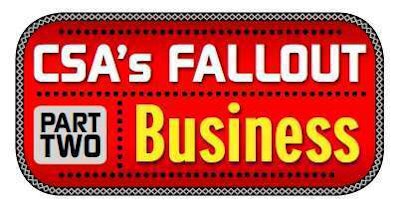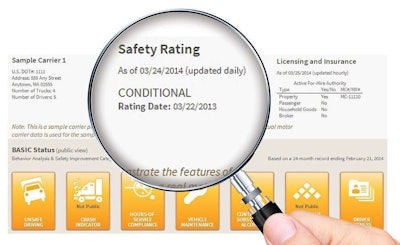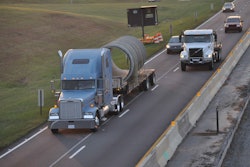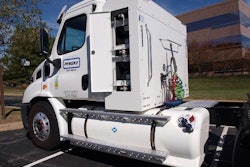The previous installment in this month’s series examined the burgeoning importance of the Conditional safety rating for carriers’ business prospects and FMCSA’s abandonment of prior policy prioritizing follow-up reviews of Conditional-rated carriers. Access that story, detailing the tale one such carrier — rated Conditional in 2012 — via this link. This installment continues that story
With no due process on follow-up reviews of Conditional carriers in the statute, says transportation attorney Henry Seaton, such carriers “get left in purgatory.” Seaton’s colleagues deal with state administrators processing petitions for review who often take the “I’ll get around to it when I get around to it” approach to such requests, he says. Others say they’ll wait for CSA scores to improve before reviewing a petition.
Old Time Express’ Mark White, with a Conditional rating handed down in 2012, saw it firsthand. “Even a convicted felon at some point serves his sentence and gets out,” he says. With further attempts at garnering a follow-up review going nowhere, about a year into the Conditional rating “we started fielding calls from direct customers,” he adds, that went something like this: “‘My safety department is really looking at this – and I can only go to bat for you for so long.’ And then you start getting rejected bidding on new business, and it starts to really irritate you.”

“There’s always going to be the ‘us against them’ mentality between the DOT and trucking companies. But they have a job to do. It’s their game, and you’ve got two choices – play it by their rules, or go and find yourself another game.” –Mark White, Old Time Express
At wits’ end, in spring 2013, the Whites said to themselves, “What if we just go e-logs?”
About the same time, Brands Truck Insurance, the company’s agent, offered to send a consultant it uses for just this kind of situation, White says.
Even the consultant was surprised at Old Time Express’ decision, in May 2013, to begin trying out an Omnitracs e-logs system. The carrier invested $20,000 in the system and ongoing $40-per-unit subscription fees. It was a huge expense for a company of its size.
The consultant, Jeff Davis of Fleet Safety Services, eventually felt the move was a savvy one when it came to pleasing FMCSA’s Tennessee division, White says. With continuing federal moves toward an electronic-log mandate, “he thought we were really setting ourselves up to be the poster child for what they wanted to happen.”
 Access all of Overdrive‘s past special coverage of CSA via this link.
Access all of Overdrive‘s past special coverage of CSA via this link.Still, however, Old Time Express’ circumstances didn’t change until it was called into FMCSA’s Tennessee division at the Nashville headquarters in March of this year, after two years under the Conditional status. Officials reviewed compliance evidence prepared by Davis and recommended a reinstatement of Old Time Express’ prior Satisfactory rating to the regional Atlanta office. It was approved days later.
White and others suggest that reinstatements like that which Old Time Express received – with just a visit to the FMCSA division office – are rare, given a carrier rated Conditional after being unrated would require another onsite audit. It helps when you have a consultant who knows how to work the system on your side, to “jump through the hoops” to get things done, White says today. Adopting e-logs for an hours problem certainly didn’t hurt the company’s chances. Without all of it “and a great insurance provider who made that happen,” he adds, “we might not be where we are today.”
It took only two months for reinstatement of Old Time Express’ Satisfactory rating to take “some of the heat off of us” from increasingly concerned shippers, White says. “One very large shipper that had approached us” when Old Time Express was Conditional and then backed off has now “finished the new-carrier setup process,” White says.
As for the brokers whose knee-jerk reaction was to pull away from the company, Old Time Express has taken note: “We won’t be doing business with them again.”
 FMCSA has been somewhat consistent in its review of carriers when considered according to the size of the fleet.
FMCSA has been somewhat consistent in its review of carriers when considered according to the size of the fleet.
 PUBLIC SCRUTINY OF SAFETY RATINGS IN CSA SMS STILL UNCERTAIN | Today, while a carrier’s Compliance, Safety, Accountability Safety Measurement System profile front page shows its investigation history, it does not list any safety rating information from the SafeStat system. Following recommendations from industry stakeholders in 2013, however, the FMCSA introduced a proposed revamp of the online display that, front and center of a carrier’s front page, includes that carrier’s current safety rating (see above). During the February 2013 meeting of FMCSA’s Motor Carrier Safety Advisory Committee, Associate Administrator for Enforcement Bill Quade said changes he described as “just tweaks here or there” could be implemented as early as May 2013. Still, however, the change had not been made. Among those no doubt to be unhappy with the display changes is Rick Gobbell, formerly of FMCSA’s Tennessee division and currently a regulatory consultant to industry operating near Nashville, Tenn. In his prior role as the National Association of Small Trucking Companies’ vice president of safety and compliance, Gobbell submitted comments to the federal docket on the display changes that excoriated the agency over its public display of CSA scoring metrics. Gobbell argued the bell-curve nature of the SMS BASIC scores “demonizes … 35 percent of carriers all the time,” thus providing convenient statistical justification for FMCSA budget requests. “It challenges our faith in our federal government,” he wrote, “when one of our agencies, without going through a Rulemaking proceeding, decides that it is acceptable to damage good people in order to get to the 5-8 percent of our industry that are truly ‘bad actors.’ … This type of mindset creates collateral damage to someone incidental of the intended target. This happens every day with CSA/SMS displays.”
PUBLIC SCRUTINY OF SAFETY RATINGS IN CSA SMS STILL UNCERTAIN | Today, while a carrier’s Compliance, Safety, Accountability Safety Measurement System profile front page shows its investigation history, it does not list any safety rating information from the SafeStat system. Following recommendations from industry stakeholders in 2013, however, the FMCSA introduced a proposed revamp of the online display that, front and center of a carrier’s front page, includes that carrier’s current safety rating (see above). During the February 2013 meeting of FMCSA’s Motor Carrier Safety Advisory Committee, Associate Administrator for Enforcement Bill Quade said changes he described as “just tweaks here or there” could be implemented as early as May 2013. Still, however, the change had not been made. Among those no doubt to be unhappy with the display changes is Rick Gobbell, formerly of FMCSA’s Tennessee division and currently a regulatory consultant to industry operating near Nashville, Tenn. In his prior role as the National Association of Small Trucking Companies’ vice president of safety and compliance, Gobbell submitted comments to the federal docket on the display changes that excoriated the agency over its public display of CSA scoring metrics. Gobbell argued the bell-curve nature of the SMS BASIC scores “demonizes … 35 percent of carriers all the time,” thus providing convenient statistical justification for FMCSA budget requests. “It challenges our faith in our federal government,” he wrote, “when one of our agencies, without going through a Rulemaking proceeding, decides that it is acceptable to damage good people in order to get to the 5-8 percent of our industry that are truly ‘bad actors.’ … This type of mindset creates collateral damage to someone incidental of the intended target. This happens every day with CSA/SMS displays.”









